#small victories and all
Text

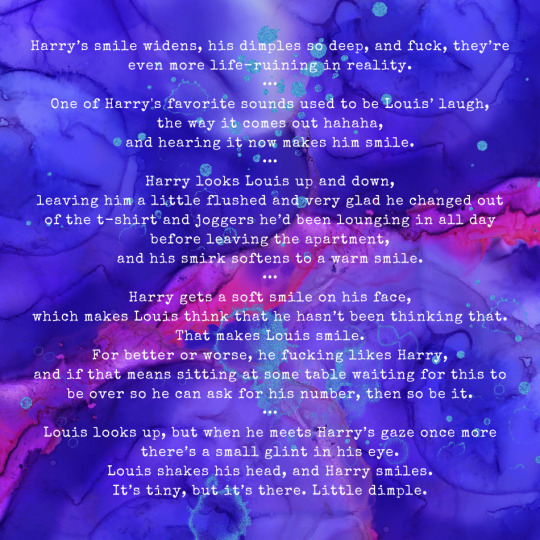


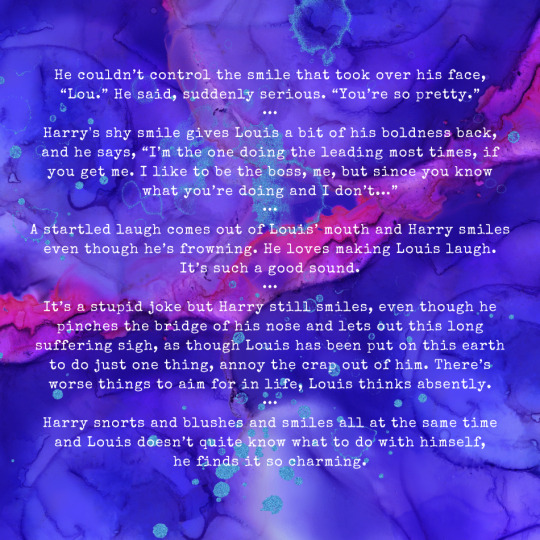
⚈ Unbelievers by @isthatyoularry | 136k8
Bloodsport by @isthatyoularry | 172k
⚈ You Can Hear It In The Silence by @imogenleewriter | 234k
⚈ saw some things on the other side by @so-why-let-your-voice-be-tamedlet-you | 61k
⚈ another dream but always you by @nobodymoves | 60k
⚈ Teach Me Your Ways by @elsi-bee | 34k
⚈ elephant juice @aliensingucci | 32k
⚈ 'cause I want you (for the worse and for the better) by @absoloutenonsense | 26k
⚈ Play for Keeps by @all-these-larrythings | 18k
⚈ Single Bells Ring by @absoloutenonsense | 16k
⚈ It Will Always Be You by @phdmama | 15k
⚈ Where All Roads Lead by @all-these-larrythings | 7k
⚈ Rode Hard and Put Away Wet by @kingsofeverything | 6k
⚈ Truth or Drink by @kingsofeverything | 6k
⚈ Running Through A Cloud Of Steam by @allwaswell16 | 5k
⚈ 'Sno(w) joke by @sun-tomato | 5k
⚈ Been Waitin' (After Weekend After Weekend After) by @absoloutenonsense | 3k
⚈ Run To You by @neondiamond | 2k
⚈ Lapful Of Lou by @itsnotreal | 2k
⚈ an honest mistake by @disgruntledkittenface | 2k
#another year where my brain didn't let me read much#or at all really#i did start another hobby though#small victories and all#hoping next year will be better#hope you all had good years!!#thank you to all the authors and this list and all the authors i didn't get to read yet <333#fic rec post#2023 fic rec#28th appreciation#larry fic rec#hlficlibrary
112 notes
·
View notes
Text
covid again for the little man. gonna give it... 4 days at the most before i return a positive test too bc i feel like SHIT. second time this year after avoiding it right up until february
#no point to this just complaining#at least im not forced to isolate with the ex this time ig#small victories and all#right at the very start of school/kinder holidays though ffs
7 notes
·
View notes
Text
The thing I keep coming back to, with all the *gestures expansively* is that real life doesn't have peaceful epilogues.
Every single win has to be defended. Forever. I'm sorry. It sucks. The Nazis lost until they stopped losing. The US had abortion rights, and then 50 years later it didn't. Empires fall, and then they invade other countries again. Oppressive regimes are overthrown and replaced with other oppressive regimes. You will never finish the work etc etc etc. Which is why it's so fucking important to be able to acknowledge and celebrate progress, when it happens. The people who came before you didn't put in all that work for nothing, and you aren't, either. You can't save it all for the Ultimate Victory because there is never going to be an Ultimate Victory. There's no such thing as a time when everything is good, and ours shall not be the commune of Heaven.
#rambling#like by all means always push for more#but man you gotta be able to note the small victories too#and you have to be able to step away for a bit when you need to because there's never going to be an Ultimate End#op
18K notes
·
View notes
Text
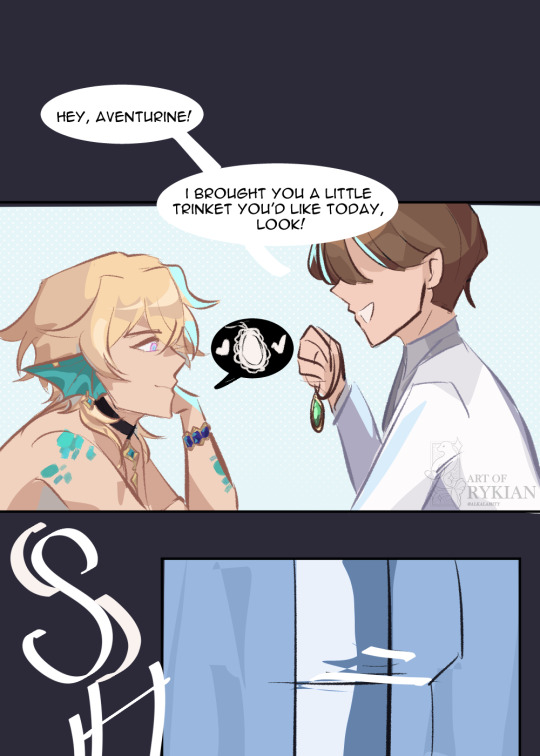
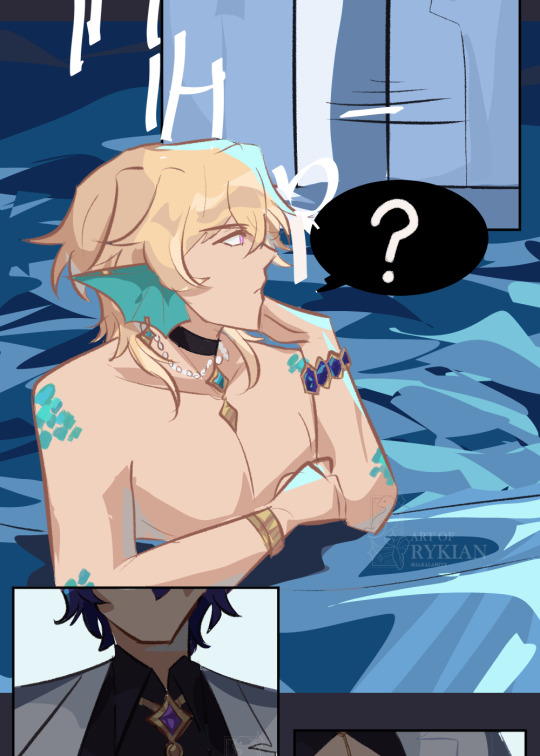
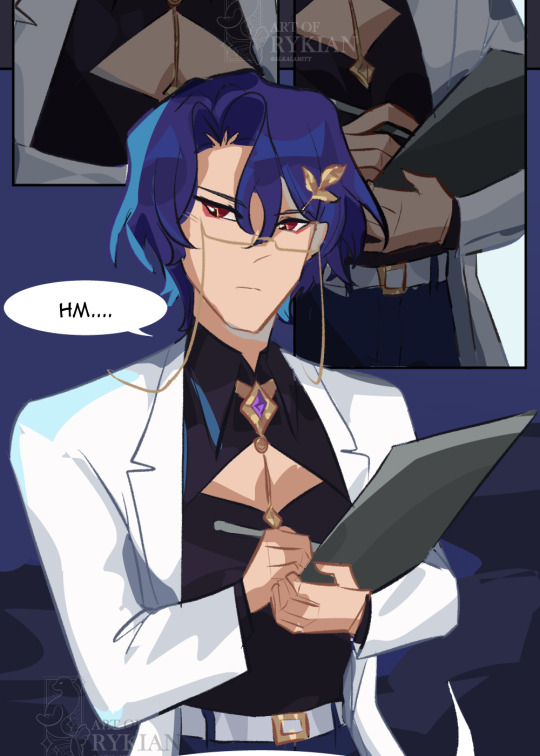
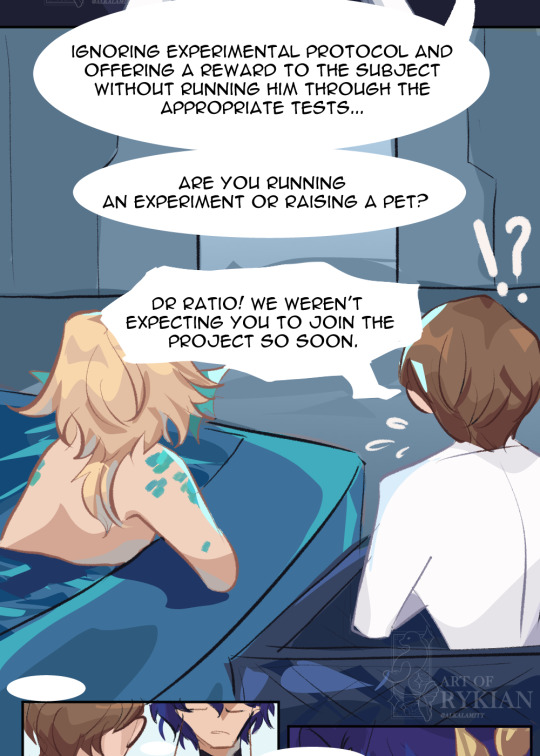
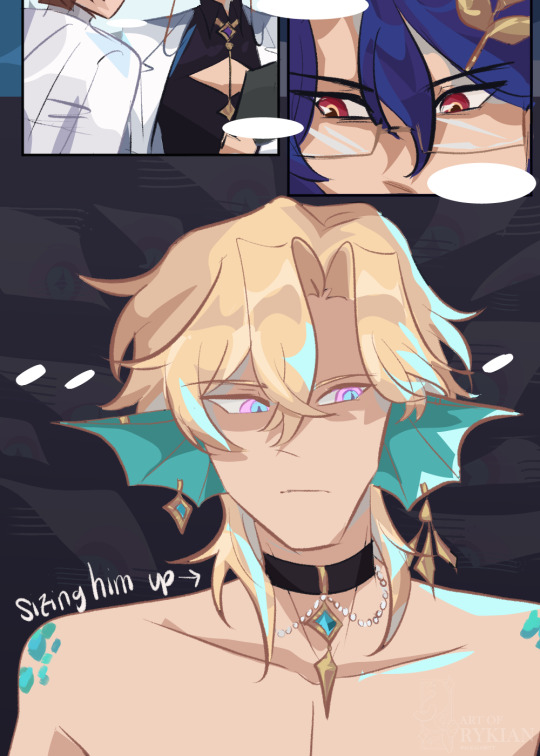
Hear me out. Ratiorine AU where Aventurine is a mer captured by a group of researchers and Ratio is the scientist brought on board to teach him how to speak and access his intelligence levels.
#aventurine#hsr aventurine#dr ratio#hsr dr ratio#hsr#honkai star rail#star rail#ratiorine#raturine#aventio#mermaid au#mer!aventurine#see ok listen#aventurine is a very smart fish and while he cant speak Human#he can communicate by impressing the idea of something on someone#which is why his speech bubbles are all abstract things bc he communicates by sending the idea of what he wants to say to ppls brains#and hes clever hes our cunning merchant gambler#so while he was initially captured by some researchers to be studied#hes able to charm them up and get them on his side... thus allowing him to have more luxury than the average experiemental subject#ofc none of this reallt matters when the researchers wont let him go free but its the smalle victories...#eventually hell work his way up to freedom#ratio is the poor sap who was dragged into the study half way to teach aventuring how to Be Human basically#he accepts the proposition bc everyone deserves to have knowledge! even fish!#my art#comics#scribbles
543 notes
·
View notes
Text

Me:

#i all but danced#victory lap for my ship#go home Gerald#i am so petty about this#siegfried x audrey#siegfried farnon#acgas#acgas 2020#acgas spoilers#audrey hall#all creatures great and small#memes#funny#my otp#samuel west#anna madeley
168 notes
·
View notes
Text
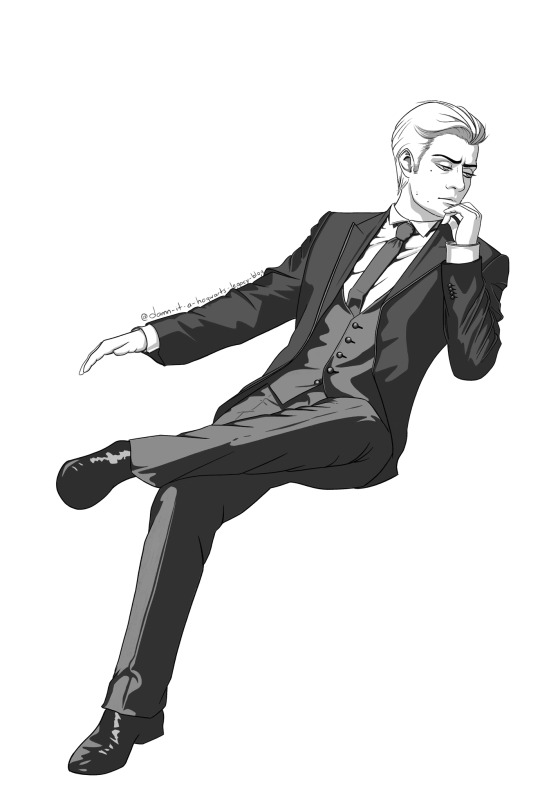

Ominis Gaunt all grown up 🐍
#what’s he thinkin about?? 👀#hogwarts legacy#ominis gaunt#hogwarts legacy art#hogwarts legacy fanart#yes I both draw and write :^)#it feels so good to finally see a piece through#I have been struggling with horrific perfectionism for so long#its referencing a stock photo but its better than nothing and I don’t wanna delete it#small victories#I’m so happy to finally contribute art to the HL fandom 🥺#don’t mind me just making a tag for my blog#deek thinks you should be proud of all the art you've made
224 notes
·
View notes
Text
the one yugioh spinoff liker W we get is that sometimes when there's merch drops they'll just bust out a completely random non-main character on a keychain or something, and sometimes if we're REALLY lucky theyll be on a whole ass shirt or a big ol acrylic stand. sorry about the endless yami yugi and kaiba merch mines my Duel Monsters minor character enjoyers,
#and SOMETIMES joey or yami b. if we're all lucky. ryou found dead in a ditch off the side of the highway#ygo posting#meanwhile the spinoffs are i nthis sort of golden age of getting merch for COMPLETELY off the wall characters?!?! MY GUYS SPECIFICALLY??!?#the arc vee anniversary cafe merch rockin out with riley and shay in his dyke explorers outfit from that one OP#we take the small victories. the noble and proud spinoff warriors.
31 notes
·
View notes
Text
okay so while im a STRONG advocate for stupidly pathetic and cringefail cwilbur over manipulator “mastermind” cwilbur i think there does need to be an understanding that he does hold a level of competence and cleverness and wittiness that exceeds others BUT hes over reliant on it when it can only get him so far since he lacks the true thirst for power and maliciousness needed to make these attributes anything to fear -> he holds the ambition and the silver tongue and everything else people say he does but none of the cruelness that is expected which makes his plans scatterbrained and comical except for when theyre just entirely sad
#wilbur soot#cwilbur#like what im tryna say is he isnt stupid#hes fucking oblivious to hell and back thats for sure#but hes clever and smart that needs to be remembered bc thats partly what makes his character so sad#bc u can see the train of logic but ur also aware of how horribly wrong it can all go#AND it does a disservice to his moments of clarity where he does get a single small victory even if its personal and miniscule#getting this in before last stream wooo!#yeah ueahh im still talking abt his character idgaf.#rambles
437 notes
·
View notes
Text

is everyone but ferrari having problems again???? the curse of australia is still lingering in the air
#Charles not complaining about the car thank god for small victories#charles pole AND p1 so true#literally williams is a disaster#dr3 spinning out of control#idk what’s happening at mclaren and frankly don’t care enough#and red bull apparently caused more problems not less during there upgrades this week#fun times all around to everyone but charles leclerc who is here on a MISSION#f1#formula 1#japanese gp 2024#charles leclerc#also Mercedes continues to be a mid team this season wbk#also hbd op81 hope u have a blast out there today
17 notes
·
View notes
Photo

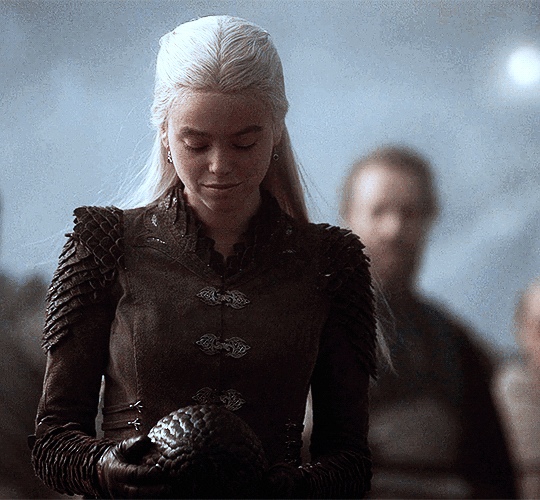
#it's like... #giving back a stolen candy to a child
#rhaenyra targaryen#hotd#hotdedit#tvedit#hotdcentral#usersuzana#daemon basically handing this small victory to rhaenyra bc he knows she needs it more#(he can't have his niece look stupid or weak in front of all these people)(ESPECIALLY in front of that bitch otto hightower)#like..what else he could do in that situation besides caving in? this highly anticipating meeting of his didn't go#according to his plan anyway! no big brother to banter with face to face and no plausible excuse to kill otto either!#perciedit#1x02
347 notes
·
View notes
Text
When I was a kid I would get this very deep visceral reaction when ever I would see queer women on screen or in books. Like reread Carmilla so many times cause the very idea of women liking other women was just revolutionary to me.
So to be able to make art of my own with queer women (and queer Black women at that) is just wonderful for me.
I actually think there's only one straight main character in Small Victories right now, which wasn't even on purpose it's just sorta how it worked out.

#All of WGC shows are about wlw#Again not as a company mandate#Just cause I'm the one making shows right now#And I guess that's just how I see the world#small victories#small victories podcast#audio fiction#audio drama#fiction podcast#wlw love#queer podcast#queer love
42 notes
·
View notes
Text
I FINALLY HAD A MEAL! I DONT FEEL LIKE SHIT ANYMORE
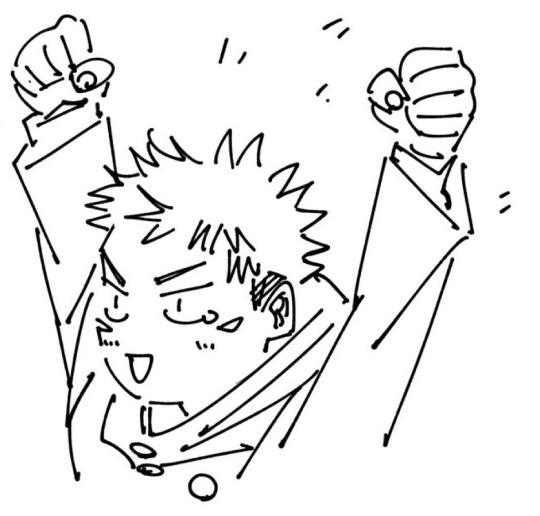
#small victories small victories#after finally eating something all of my hunger just comes crashing down on me so that’s kinda not good#but whatever#to delete#< maybe
18 notes
·
View notes
Text
doing Things.....making progress.....
#it's very slow going but it is going regardless 🥹#celebrate the small victories and all that 🥹#✿ shut up willow
17 notes
·
View notes
Text
After I write that new IDW Optimus meta, the next one is gonna be a post of "why I really hate that theory about Rodimus being a better Prime than Optimus and how it doesn't even match the themes of IDW OR canon fact about how the Matrix functions."
But the TLDR that I feel like encapsulates where a lot of this fanwank comes from, is that I feel like ppl don't properly appreciate that the context of Optimus and Rodimus' leaderships are extremely different.
Like, Rodimus only led a ship of about 200+ people. This means that the scale of his leadership responsibilities and the risks/consequences/stakes of his actions as leader were much smaller in scale. However, it also means that just because he only led one ship of people doesn't mean that his choices weren't important/weren't indicative of his personal character (that is to say, just bc it was only one ship doesn't mean that it had no meaning or significance at all).
On the other hand, Optimus led an entire freaking army over a 4 million year war that arose from political tensions that began even before he/most of the people in the war were born. That means that the consequences of his leadership had extremely far reaching consequences no matter what he did, which grants him a large degree of culpability/blame for his actions. HOWEVER, it must also be said that under the pressure of fighting an impossible war, just because OP wasn't able to "stop it sooner" doesn't mean that he was a morally bad/incompetent leader, because a whole galactic war is such a huge burden that one person can't possibly stop it or influence/control everything to make the most morally correct and peace-causing decisions.
TLDR can we please stop pitting Optimus and Rodimus against each other when the contexts of them being leaders was so vastly different (and they had such different leadership styles in general) that you can't really say "who's the better leader" without minimizing either of their accomplishments/magnifying their respective flaws.
Also, canonically speaking the Matrix can be wielded by anyone who's confident/at peace/self-righteous enough to believe they're worthy of it, which was shown not only by the ending of LL where a bunch of regular ass crewmates were able to use copies of the Matrix, but by the fact that the first Prime/ruler of Cybertron Nova Prime was a massive piece of shit who colonized people, yet was still a Matrix bearer who wielded the true/original Matrix.
And also Primus is literally Just Some Guy and not some omnipotent god who's an objective arbiter of morality that can point at a guy and go "YOU are the Specialest Boy Ever and are Divinely Mandated To Be A Good person"
So the entire premise of why ppl even make theories and debate about this is beyond me lol. In IDW1 the Matrix is more of a social/cultural symbol than it is an actual measurer of morality, which is in line with IDW1's consistent themes of challenging the inherent rightness of authority
#squiggposting#like frex i wouldn't say rod is inherently a worse leader just bc OP was a general and he wasn't#not every good leader needs to be The Top Leader In Charge and small scale impacts are important in their own way#likewise i wouldn't say that OP is inherently a worse leader because bigger and badder things happened under his leadership#bc the problem is that when you're a leader of a whole ass army the scale of all of your actions is much larger#so just as your heroic deeds and victories will be larger. so too will your fuckups and flaws#OP and Rod are also both good people with good intentions so like#which one of them is a 'better person' is generally subjective and more up to how you individually measure their virtues/vices#meta#i mean literally one of the central sources of conflict in idw1 (functionism) was put into place by a religious body#sooooooo why is it ppl are using the matrix as a religious justification for who The Best Prime is?#like bud the last time cybertronians used religion/alleged godhood as justification for their leader/government#they invented a fucking caste system and colonized the galaxy#even if the matrix had some divine power to objectively decide on Moral Goodness it's kind of a shit judge of character
12 notes
·
View notes
Text
Each, All, Everything
Words: 6.5k
Rating: PG
Themes: Friendship, Self-Giving Love, Romantic Love
(Written for the Four Loves Fairytale Retelling challenge over at the @inklings-challenge! A retelling of Nix, Nought, Nothing.)
The giant’s daughter weeps, and remembers.
—
She remembers the day her father first brought him home.
It was a bit like the times he’d brought home creatures to amuse her while he was on his journeys, away on something he called “business” but she knew was “gathering whatever good of the land he wanted”. Her father had brought back a beautiful pony, once—a small one he could nearly carry in one huge hand. One for her, and not another for his collection of horses he kept in the long stables. She wasn’t as tall as the hills and broad as the cliffs like he was, so she couldn’t carry it easily, but she heaved it up in both arms and tried nonetheless. (And—she thought this was important—stopped trying when it showed fear.) She was gentle to it, and in time, she would only need speak to it and it would come eat from her hand like a tame bird. She’d never been happier.
(The pony had grown fearful of her father. Her father grew angry with anything that wasted his time by cowering or trying to flee him. There was a terrible commotion in the stables one day, and when she sought her pony afterward, she couldn’t find him. Her father told her it was gone, back to the forest, and he’d hear no more of it if she didn’t want beaten.)
(There was a sinking little pit in her stomach that knew. But when she didn’t look for the best in her father, it angered him and saddened her, so she made herself believe him.)
The final little creature he brought one day was so peculiar. It was a human boy, small as the bushes she would sometime uproot for paintbrushes, dressed in fine green like the trees and gold like her mother’s vine-ring she wore. He seemed young, like her. His tuft of brown hair was mussed by the wind, and his dark eyes watched everything around him, wide and unsure and curious.
When he first looked at her from his perch on her father’s shoulder, he stared for a long moment—then lifted a tiny hand in a wave. Suddenly overwhelmed with hope and possibilities (a friend! Surely her father had blessed her with a small friend they could keep and not just a pet!), she lifted her own hand in a little wave and tried to smile welcomingly.
The boy stared for another long moment, then seemed to try a hesitant smile back.
“This,” boomed her father, stooping down in the mist of the morning as he waved away a low cloud with one hand, “is what I rightly bargained for. A prince, very valuable. The King of the South—curse his deceitful aims!—promised him to me.”
“He looks very fancy,” she’d said, eyes wide in wonder. “How did the king come to give him to you, Father?”
“How indeed!” the giant growled, so loud it sent leaves rattling and birds rushing to fly from their trees. He slowly lowered himself to be seated on the weathered cliff behind him and picked up his spark-stone, tossing a few felled trees into their fire-basin and beginning to work at lighting them. “Through lies and deceit from him. When he asked me to carry him across the waters I asked him for Nix, Nought, Nothing in return.”
The little boy shifted, clearly uncomfortable but afraid to move much. Her father scowled, though he meant it as a smile, and bared his yellowed teeth as he laughed.
“Imagine his countenance when he returned to find the son he’d not known he’d had was called Nix, Nought, Nothing! He tried to send servant boys, but I am too keen for such trickery. Their blood is on the hands of the liar who sent them to me.”
Such talk from her father had always unsettled her, even if he said it so forcefully she couldn’t imagine just how it wasn’t right. Judging from the way the boy curled in on himself a little, clinging meekly to her father’s tattered shirt-shoulder, he thought similarly.
“Nix, Nought, Nothing?” She observed the small prince, unsure why disappointment arose in her at the way he seemed hesitant to look at her now. “That is a strange name.”
Her father struck the rocks, the sound of it so loud it echoed down the valley in an odd, uneven manner. He shook his head as he worked, a stained tooth poking out of his lips as he struck it again and again until large sparks began alighting on the wood.
“His mother tarried christening him until the father returned, calling him such instead.” He huffed a chuckle that sounded more like a sneer, seeming to opt to ignore the creature on his shoulder for the time being. “You know the feeling, eh, Bonny girl?”
The boy tentatively looked up at her again.
The fire crackled and began to eat away at the bark and dry pine needles. A soft orange glow began to creep over it, leaving black char as it went. With a sudden, sharp breath by her father, a large flame leapt into the air.
“It is good that she did so. He is Nix, Nought, Nothing—and that he will remain.”
—
Nix Nought Nothing grew to be a fine boy. Her father treated him as well as he did the prized horses he’d taken from knights and heroes—which was to say that the boy was given decent food and a dry place to sleep and the richest-looking clothes a tailor could be terrified into giving them, which was as well as her father treated anything.
Never a day went by that she was not thankful and with joy in her heart at having a friend so near.
They spent many days while her father was away exploring the forest—Nix would collect small rocks and unusual leaves and robin’s-eggs and butterflies, and she would lift him into high trees to look for nests, and sometimes stand in the rivers and splash the waterfalls at him just to laugh brightly at his gawking and laughing and sputtering.
Some days she wished she was more of a proper giant. She wasn’t large enough for it to be very comfortable giving him rides on her shoulder once he’d grown. She was hesitant to look any less strong, however, so she braided her golden curls to keep them from brushing him off and simply kept her head tilted away from him as they walked through the forests together.
He could sit quite easily and talk by her ear as they adventured. Perhaps she would never admit it, but she liked that. Most of the time.
“I’m getting your shoulder wet,” he protested, still sopping wet from the waterfall. He kept shifting around, trying to sit differently and avoid blotching her blue dress with more water than he already had. “I hope you’re noticing this inconveniences you too?”
“Yes,” Bonny laughed. “You’re right. I hope there’s still enough sun to dry us along the way back. Father won’t be pleased otherwise.”
“Exactly. Perhaps you should have thought that through before drenching me!” he huffed, but she could hear the grin in his tone even if she couldn’t quite turn her head to see it. He flicked his arm toward her and sent little droplets of water scattering across the side of her face.
Her shoulders jerked up involuntarily as the eye closest to him shut and she tried to crane her neck even further away, chuckling. Nix made a noise like he’d swallowed whatever words were on his tongue, clutching to her shoulder and hair to steady himself.
“You’d probably be best not trying to get me while I’m giving you a ride?” Bonny suggested, unable to help a wry smile.
“Yes. Agreed. Apologies.” His words came so stilted and readily that she had to purse her lips to keep in a laugh. As soon as he relaxed, his voice grew a tad incredulous. “Though—wait, I can’t exactly do anything once I’m down. Are you trying to escape my well-earned retaliation?”
“I would never,” she assured him, no longer trying to hide her smile. “I’ll put you in a tree when we get back and you can splash me all you like.”
Somehow, his voice was amused and skeptical and unimpressed by the notion all at once.
“Really? You’d do that?” he asked, sounding as if he were stifling a smirk.
She shrugged—gently, of course, but with a little inward sense of mischievousness—and he yelped again at the movement.
“Well, it would take a lot of water to get a giant wet,” she reasoned. “I doubt you’ll do much. But yes, for you, I would brave it.”
He chuckled, and she ventured a glance at him out of the corner of her eye.
“Bonny and brave,” he said, looking up at her with a little smile and those dark eyes glimmering with light. “You are a marvel.”
It would probably be very noticeable to him if she swallowed awkwardly and glanced away a bit in embarrassment. She tried not to do that, and instead gave him a crooked little smile in return.
“Hm,” was all she could say. “And what about you?”
“Me? Oh, I’m Nothing.” The jest was terrible, and would still be terrible even if she hadn’t heard it numerous times. “But you are truly a gem among girls.”
If by gem he meant a giantess who still had to enlist his help disentangling birds from her hair, then perhaps. She snorted.
“I don’t know how you would know. You don’t know any other girls.”
“Why would I need to?” His face was innocent, but his eyes were sparkling with mirth and mischief. “You’re the size of forty of them.”
The noise that erupted from her was so abrupt and embarrassingly like a snort it sent the branches trembling. She plucked him off her shoulder and set him gently on the ground so she could swat at him as gently as she could—careful not to strike him with the leaf-motifs on her ring—though it still knocked him off his feet and into the grass. He was laughing too hard to seem to mind, and she couldn’t stifle her laughs either.
“Well, you are really something,” she teased, unable to help her wide smile as she tried futilely to cast him a disapproving look.
That quieted him. He pushed himself to sit upright in the grass, and looked out at the woods ahead for a long moment.
“You think?” Nix asked quietly.
She smiled down at him.
“Yes,” she laughed softly. “Of course.” When he looked up at her, brown eyes curious, she held his gaze and hoped he could see just how glad she was to know him. “Everything, even.”
A small smile grew on his own face, lopsided and warm. He ducked his head a bit and looked away from her again, and embarrassment started to fill her—but it was worth it.
It often weighed on her heart to say that more than she did. She supposed she was the type of person who liked to show such things rather than say them.
She had a cramp in one of her shoulders from trying to carry him smoothly, but the weight on the other one—and on his—seemed far lighter.
—
She remembered the day her father came home livid.
She couldn’t figure out what had happened. Had he been wounded? Insulted? Tricked? He wouldn’t say.
He just raged. The trees bent under his wrath as he stamped them down, carving a new path through the forest. He picked up boulders and flung them at cliffsides, the noise of the impacts like thunder as showers of shattered stone flew in all directions.
She was tending to the garden a ways off—huge vines and stalks entwined their ways up poles and hill-high arbors made from towering pines, where she liked to work and admire how the sunset made the leaves glow gold—and suddenly had a sharp, sinking feeling.
Nix was still at his little shelter-house at their encampment. Her father was there.
Dread washed over her.
“Riddle me this, boy,” her father boomed, in the voice he only used when he wanted an excuse to strike something. “What is thick like glass and thin as air, cold but warm, ugly but fair? Fills the air yet never fills it, never exists but that all things will it?”
There was silence for a long moment.
...Silence. The answer was silence. Her father was trying to trick him into speaking.
Her hands curled around the bucket handle so weakly it was a surprise she didn’t drop it. Her father could crush him if he felt he had the slightest excuse.
Hush, hush, hush, her mind pleaded. Her hands shook. For your life and mine, hush—
There continued to be silence for a moment—and then, Nix must have answered. (Perhaps in jest. He tended to joke when uncertain. That would have been a mistake.)
There came the indescribable sound of a tree being ripped from its roots, and the deafening thunder of it being thrown and smashing down trees and structures.
Her whole body tensed horribly, and all she could see in her mind’s eye was nightmares.
No, she thought weakly.
Her father kept shouting. But not just shouting, addressing. Asking scathing rhetorical questions. She felt faint with relief, because her father had never wasted words on the dead.
I should have brought him with me. The thought flooded her body and left room for nothing else but dread and regret. I could have prevented this.
The stables were long and broad and old. Once, they had housed armies’ steeds and chariots. Now, they were run-down and reinforced so nothing could escape out the doors. The roof was broken off like a lid on hinges at intervals so her father could reach in to arrange and feed his horses.
Her father had seen no reason to keep the stalls clean. When one was so packed with bedding it had decomposed to soil at the floor level, the horse was moved to the next unused stall. There were so many stalls that she barely remembered, sometimes, that there were other ways of addressing the problem.
“The stable has not been cleaned in seven years,” her father boomed. “You will clean it tomorrow, or I will eat you in my stew.”
She couldn’t hear Nix’s response, but she could feel his dread.
Her father stormed away, more violently than any storm, and slowly, after the echoes of his steps faded, silence again began to hang in the air.
That night, it was hard to sleep. The next morning, it was hard to think.
She did the only thing she could think to do in such a nervous state. She brought her friend breakfast. His favorite breakfast—a roast leg of venison and a little knife he could use to cut off what he wanted of it, and fried turkey-eggs, and a modest chunk of soft brown bread.
When she arrived with it, he was still mucking out the first stall. There were hundreds ahead of him. He was only halfway to the floor of the first.
“I can’t eat,” Nix murmured, almost too quietly to hear and with too much misery to bear. “I can’t stop. But thank you.”
The pile outside the door he’d opened up was already growing too large. Of every pitchfork-full he threw out, some began to tumble back in. He was growing frustrated, and out of breath.
Why would her father raise a boy, a prince, only to eat him now? Her father was cunning; surely he’d had other plans for him. Or perhaps he really was kept like the horses, as a trophy or prize taken from the human kingdoms that giants so hated.
Was this his fate? Worked beyond reason, only to be killed?
Pity—or something stronger, perhaps, that she couldn’t name—stirred in her heart. A heat filled her veins, burning with sadness and a desire to set right. Would the world be worthwhile without this one small person in it?
No.
This wouldn’t end this way.
She called to the birds of the air and all the creatures of the forest. Her heart-song was sad and pure—so when she pleaded with them, to please hear, please come and carry away straw and earth and care for what has been neglected, they listened.
The stable was clean by the time the first stars appeared. When she set Nix gently on her shoulder afterward, he hugged the side of her head and laughed in weary relief for a long while.
—
She remembered the lake, and the tree.
“Shame on the wit who helped you,” her father had boomed. He’d inspected the stable by the light of his torch—a ship’s mast he’d wrapped the sails around the top of and drenched in oil—and found every last piece of dirt and straw gone. Had he known it was her, that she could do such a thing? She couldn’t tell. “But I have a worse task for you tomorrow.”
The lake nearest them was miles long, and miles wide, and so deep that even her father could not ford it.
“You will drain it dry by nightfall, or I will have you in my stew.”
The next morning, soon as her father had gone away past the hills, she came to the edge of the lake. She could hear the splashing before she saw it.
Nix stood knee-deep in the water, a large wooden bucket in his hands, struggling to heave the water out and into a trench he’d dug beside the shore.
When she neared him and knelt down in the sand, scanning the water and the trench and the distant, distant shoreline opposite them, Nix fell still for a moment. She looked at him, hoping he could see the apology in her eyes.
“Can I help?” she asked.
He shook his head miserably.
“Thank you. But even if we both worked all day, we couldn’t get it dry before nightfall.” He gave her a wry, sad smile, full of pain. “The birds and the creatures can’t carry buckets, I’m afraid.”
It was true. They could not take away the water.
But perhaps other things could.
She stood and drew a deep breath, and called to the fish of the rivers and lake, and to the deep places of the earth to please hear, please open your mouths and drain the lake dry.
With a tumult that shook the earth beneath them all, they did. The chasm it left in the land was great and terrible, but it was dry.
Her father was livid to see it.
“I’ve a worse job for you tomorrow,” he’d thundered at Nix as the twilight began to darken. “There is a tree that has grown from before your kind walked this land. It is many miles high, with no branches until you reach the top. Fetch me the seven eggs from the bird’s nest in its boughs, and break none, or I will eat you before the day is out.”
She found Nix at dawn the next day at the foot of the tree, staring up it with an expression more wearied than she’d ever seen before. She looked up the tree as well. It seemed to stretch up nearly to the clouds, its trunk wide and strong with not a foothold in sight. At the top, its leaves shone a faint gold in the sunlight.
“He is wrong to ask you these things,” Bonny said softly. Her words hung in the air like the sunbeams seemed to hang about the tree. There was something special about this place, some old power with roots that ran deep. “I’m very sorry for it.”
“You needn’t be,” Nix assured her. His countenance was grey, but he tried to smile. “But thank you. You’re very kind.”
She looked up the tree again. Uncertainty filled her, because this was an old tree—a strong one. Even if it could hear her, it had no obligation to listen. “Will you try?”
He laughed humorlessly. “What choice do I have?”
None. He had none.
He could not escape for long on his own—he could not be gone fast enough or hide safely enough for her father not to sniff him out. The destruction that would follow him would be far more than he would wish on the forests and villages and cities about them.
She, however, bit her lip.
She slipped the gold vine-ring off her hand, and rolled it so that it spiraled between her fingers. It was finely crafted, made to look like it was a young vine wrapping its way partly up her finger.
“This is all I have of my mother,” she said quietly. “But it will serve you better.”
Before he could speak—she knew him well enough to know that he would bid her to stop, to not lose something precious on his account (as if he weren’t?)—she whispered a birdlike song, and pleaded with the gold and the tree and the old good in the world to help them.
When she tossed the ring at the base of the tree (was it shameful that she had to quell a sadness that tried to creep into her heart?), it writhed. One end of it rooted into the ground, and suddenly it was no longer gold, but yellow-green—and the vine grew, and grew, curling around the tree as it stretched upward until it was nearly out of sight.
Nix stared at her with wide eyes and an emotion she couldn’t quite place. Whatever it was, it made her ears warm.
She smiled slightly and stepped back, tilting her head at the vine.
“Well?” she said. He was still staring at her with that look—some mix of awestruck and like he was trying to draw together words—and it made her fold her arms lightly and smile as she looked away. She quickly looked back to him, hoping faintly that her embarrassment wasn’t obvious. “You’d best hurry. That’s still a long way up.”
He seemed to give up finding words for the moment. Nix glanced up the tree, now decked with a spiral of thick, knobby vine that looked nearby like uneven stairs.
“Give me a boost?” he asked with a bright grin. “To speed it up.”
She laughed and gently scooped him up in both hands. “A boost, or just a boost?”
He beamed at her. “As high as you can get me,” he declared, waving an arm dramatically.
She laughed and shook her head. ”Absolutely not. Ready?”
Nix nodded, and she smiled thinly and poured all her focus into a spot a good distance up the tree. With a very gentle but swift motion, she tossed him upward a bit—and he landed on his feet on the vine, one shoulder against the bark, clutching to the tree for support as he laughed.
“A marvel!” he shouted down to her as he climbed. “Never forget that!”
The sun was nearly setting when he descended with the eggs bundled in his handkerchief. He was glowing.
He triumphantly hopped down the last few feet to the ground.
A moment after he landed, a soft crack sounded. He froze.
Slowly, he drew the bundle more securely into his arms against him and looked down. There, by his foot, was a little speckled egg, half-broken in the grass.
She put a hand over her mouth. Nix clutched the rest and stared.
A grievous pain and numbness slowly filled her heart, and she knew it was filling his too.
His shoulders began to shake, and his eyes were glassy.
“Well,” he laughed weakly. ”...That’s it. That’s... that was my chance.” The distress that overtook him was like a dark wave, and it threatened to cover her too. He only shook his head. “I’m so sorry. Thank you for—for helping me.”
For everything, she didn’t give him a chance to add. He was looking at her with the eyes of one who might say that. She couldn’t afford to be overcome with the notion of saying goodbye now.
“No,” she said. Her voice was quiet, at first, but it grew more resolute. “It won’t end this way.”
He blinked up at her, still clutching the other eggs to his chest. She looked down at him, then across the stretch of forest to their home.
Without a word, she gently picked him up and set him on her shoulder. Her jaw tensed as she strode quickly through well-worn paths of the forest, walking as fast as a horse could run.
Once home, she set him down. He was still looking at her questioningly. Her heart beat faster in her chest, and she hoped he couldn’t see the anxiousness rising in her and battling with the excitement.
“I will not let him have you,” she announced firmly. The trees and hills all around were witness to her promise. “Grab what you need. We’ll leave together in the hour.”
—
She‘d barely had time to fix her hair, grab her water flask, and decide it would be best this time of year to go south.
Her father’s footsteps boomed closer across the land.
—
They fled.
They ran, and ran, and struggled and strove, and she called for the help of anything she could think of that would have mercy on them.
Her comb grew into thorns, her hairpin into a hedge of jagged spires. Neither stopped him. Her dress’s hem was in tatters and sweat poured from her brow when they were finally safe.
Her flask lay behind them, cast down and broken, its magic used up.
Her father—her father—lay stretched out motionless in the flooded plain behind them, never to rise again.
—
There was a tiny spark of hope they had that they clung to. A hope of a future, of restoration, of amending the past and pursuing peace—of a life worth living, perhaps far, far away from things worth leaving behind.
(“I’ll go to the castle,” he’d said, his voice brimming with nerves and hope and uncertainty and sadness and an eager warmth. It made her heart try to mirror all those emotions alongside him. “I can tell my mother and father who I am. I’d still recognize them, even if they don’t know me. They’ll take us in, I’m sure of it.”)
He set out into the maze of village streets, assuring her he’d ask for directions and be back promptly. She stayed back by the well at the edge of the town so not to alarm anyone, too exhausted to go another step, but full of hope for him. She would wait until he returned.
(And wait. And wait. And wait and wait and wait and dread—)
The castle gardener came to draw water, and—as if she weren’t as tall as the small trees under the huge one she sat against—struck up a conversation with her about the mysterious boy who’d fallen unconscious across the threshold of the castle, asleep as if cursed to never wake up.
(The spark didn’t last long.)
—
She remembered when he could move.
“Please,” she whispered, as soft as her voice would go. “Please, if you can hear me. Wake up.”
(“Oh, dearest,” the gardener’s frail wife had murmured to her when the kind gardener brought her home to partake of a bit of supper. “I’m afraid they won’t let you in as you are. Would you let me sing you a catch as you eat?”)
The gardener’s wife was frailer by the end of it, but her heart-song could change things, like her own. Instead of towering at the heights of the houses, she was now six feet tall by human reckoning, and still thankful the castle had high halls and tall doors.
(Their daughter, a fair maiden with a shadow about her, had watched from the doorway.)
Nix Nought Nothing lay nearly motionless in the cushioned chair the castle servants had placed him in. His chest rose and fell slowly, like he was in a deep sleep.
He was still smaller than she was, but not by much. He seemed so large, or close. She could see details she’d never noticed before—his freckles, the definition of his eyelashes, the scuffs and loose threads in his tunic.
The way his head hung as if he could no longer support it.
She held him gently—oddly, now, with both her hands so small on his arms and an uncertainty of what to do now—and wept over him. She sung through her tears, her heart pleading with his very soul, but to no avail. He did not wake up.
He didn’t hear her—likely couldn’t hear her. All around him, the air was sharp and still and dead. Cursed.
Still, her heart pleaded with her, now. Try, try. Don’t stop speaking to him. Remember? He never stopped trying.
“You joke that you are nothing," she said, with every drop of earnestness in her being. "But I tell you, you are all I had, and all I had ever wished for.”
There was power in names. She knew that. But was his even a proper name? It really wasn’t—though it was all he had.
It was all she had as well. She had exhausted everything else close to her. There was nothing left to call on, to plead with, but him.
“Nix Nought Nothing,” she said softly. “Awaken, please.”
Her voice, no longer so resonant and deep with giant’s-breath, sounded foreign in her ears. It was mournful and soft like the doves of the rocks, and grieved like the groan of the earth when it split.
“I cleaned the stable, I lave the lake, and clomb the tree, all for the love of thee,” she said, her voice thickening with tears. A drop of saltwater fell and landed on his tunic, creating another of many small blotches. “And will you not awaken and speak to me?”
Nothing.
—
She didn’t remember being shown out of the room. Her vision was too blurred, and her mind was too distraught and overwhelmed. The next thing she could focus on enough to recall was that she was now seated on a stiff chair in the hall. Someone had been kind enough to set a cup of water on the little table beside her.
The towering doors creaked softly behind her, and at last, someone new entered. She looked over her shoulder, barely able to see through the dry burning left behind by her tears.
A man and a woman stood in the door. They were dressed in fine robes, and looked like nobles.
"What is the matter, dear?" the woman asked, looking over her appearance with eyes soft with pity. She came close, and her presence was like cool balm, gentle and comforting. "Why do you weep?"
The gold roses woven in the green of the woman's dress swam in her vision as she dropped her gaze, unsure what to say. These people seemed kind. But were they? Would they send her out from here, unable to return to him?
They would be right to do so. She was a stranger here, and Nix could not vouch for her like he'd planned.
"No matter what I do," she finally said softly, "I cannot get Nix Nought Nothing to awaken and speak to me."
In one moment, only the woman stood there—in the next, the man was beside her. The air was suddenly still and heavy like glass, and it felt as though there was a thread drawn taut between them all for a moment.
"Nix Nought Nothing?" they asked in unison, their voices full of something tense and heavy and sharp. When she looked up, nearly fearful at the sudden change in their tone, their faces were slack and pale.
Something stirred in her heart. Look. What do you see?
Green and gold. Their wide eyes were a familiar warm brown.
—
Now, things are changing.
According to the servant who'd been keeping an eye on him, all from the kingdom had been offered reward if they could wake the sleeping stranger, and the the gardener's daughter had succeeded. It was a mystery how it had happened—by whom had he been cursed? Her father? Then why could she not wake him, but a maiden from the castle-town here could?—but now, with the King and Queen hovering beside her and unable to stay still for anticipation, no one cared.
The gardener's daughter was fetched, and bid to sing the unspelling catch for the prince. (Prince. He was a prince, while she was a ruffian's daughter. She kept forgetting, when she was with him.) It was a haunting one that grated on her ears, as selfishly-written magics often did—and as if bitterness still crept at the girl's heart at the sight of all who were here, she left as soon as it was finished.
Nix Nought Nothing awoke—he awoke! He opened his eyes and sat up and looked at her as if seeing the sunrise after a year of darkness, and how her heart leaps high into her throat at the sight—and true to form, only blinks a few times at her as he seems to take her in before coming to terms with it.
"You look a bit different," he remarks, tilting his head slightly. "Or did I grow?"
She chokes on a snort.
"Hush," is all she can say. What had been an attempt at an unimpressed expression melts into a wavering smile. "Are you done napping now?"
He opens his mouth to retort, but a grin creeps onto his face before he can. He snickers. "Have I slept that long?"
"Nigh a week," the Queen says—and when Nix turns his head and sees her, his eyes grow wide. The Queen's smile grows broad and wavers with emotion, and the King's eyes are crinkled at the edges, and shining. "It has been a long time."
Her own father had never shown love like this—like the way Nix tries to leap from his chair at the same moment his parents rush to hold him, all of them laughing and sobbing and shouting exclamations of love and excitement and I-thought-I-would-never-see-you-agains. So much joy rolls off of them that she thinks she could have stood there watching forever and been content.
The first thing he does, after the first surge of this, is turn and introduce her to his parents, who had barely finished hugging him and kissing him and calling him their own dear son.
"This is the one who helped me," Nix says, already gesturing to her in excitement as he looks from her to his parents. "She sacrificed much to save me from the giant. Her kindness is brilliant and she blesses all who know her."
She tries not to look embarrassed at the glowing praise as Nix comes and stands beside her as he recounts their blur of a tale to his parents.
"Ah! She is bonny and brave," says the King. By the end of Nix's stories of their escapes, they're smiling warmly at her with such pride that she dips her head and smiles.
Nix Nought Nothing glances sideways up at her and raises a brow, a knowing smirk tugging at his lips.
"I've tried to tell her that," he agrees. "I don't think she's ever believed me."
She purses her lips and glances down at him. "I'll believe it the day you believe you are not nothing."
"Alright." Simple as that, he folds his arms and raises a brow at her. "I believe it. Fair trade?"
"Fair enough," she decides, with a crooked little smile. He beams, as if she's done something worth being proud of, and looks to his parents, who indeed look proud of them both.
"We would welcome you as our daughter," the King declares heartily, and both the Queen and Nix brighten, which makes her too embarrassedly fixated on the thought of family? Starting anew? to register what comes next. "Surely, you should be married!"
Nix looks at her, arms still folded, his eyes twinkling. There's something hopeful in his eyes that makes her certain this diminutive new heart of hers has skipped a few beats.
"Should we? Surely?" he asks, as if this is a normal thing to be discussing.
She works her jaw and swallows a few times, unable to help how obviously awkward she still likely looks. A flush tickles her face, and the queen seems to put a hand over her mouth to smile behind it.
"I... don't... suppose... I would mind," she manages, and—with those bright eyes so affectionate, and on her—Nix starts snickering at her expression. It's rude, but so, so warm she can't mind. She only discovers how broadly she's smiling when she tries to purse her lips and glare at him but is unable to. "Oh, go back to sleep!" she chides, too gleeful inside to truly mind, even as she makes a motion as if throwing one of the chair-cushions at him.
"Never!" he declares, pretending to dodge the invisible pillow. He makes broad gestures that she presumes are meant to emphasize how serious he is about this. When he stands straight and tall and sets his shoulders, she thinks that the boy she's explored the forest with really does look like a prince. "I have my family and my love all together in safety at last. We have much to speak of, and much time yet to spend with each other." He's a prince, but of course, he's also still himself. He immediately gets a mischievous glimmer in his eyes and puts a hand to his chest nobly as he does what he's done for as long as she's known him—jokes, when his emotions rise. "I shall never adhere to a bedtime as long as I live!"
My love, her heart still repeats every time it beats—as payback, likely, for her calling it diminutive. My love, my love, my love.
She doesn't let it out, for she doesn't know what it will do. But the words weave a song within her, so vibrant and effervescent and strong, brighter and clearer than any she's had before.
"I am glad to see you are certainly still my dear son," the Queen says, her own eyes twinkling. "I'm certain you both need fed well after such a journey. Come, perhaps you both can tell us more of it as supper is prepared."
They fall into an easy tumble of conversation and rejoicing and genial planning, and her heart is so light she thinks it must be plotting to escape her chest.
On the week's end from when she brought him here, Nix Nought Nothing and his family welcomes her into their home. It feels natural. It feels warm, and homey, and so pleasant and right that she often has to stop tears of weary joy from welling up as she considers it all.
Once upon a time, she thought she'd known happiness well enough without him. She had known what it was like to be without a friend, and without love.
Now, it’s hard to remember it.
#inklingschallenge#four loves fairy tale retelling challenge#each all everything#theme: philia#theme: eros#story: complete#Nix Nought Nothing#fairy tale retelling#And there we have it!! A THING that is now FINISHED#Some changes have been made from the original fairytale#such as: no one’s losing their toes like that on my watch!!#please note that having everyone keep their toes actually improves the story#by letting the characters be happier thanks to having toes#you’re welcome#edit: I forgot it was fingers AND toes#oof??#this is an extremities-safe zone#Bonny and Nix#There are some parts of this I’m not sure are the best they could be BUT it’s FINISHED and that was my main goal!#(I don't finish things I start writing near often enough; so whoo! Small victory!)#wait a minute did I include all four types of love??#I DID#that's hilarious that was not intentional#at the discretion of the contest runner to include; as doing all four sounds a bit extra:#theme: storge#theme: agape#This was supposed to be a friendship/romantic love combination that would surprise no one who has read my writing#imagine my own (retrospectively unwarranted) surprise when it turned into an excuse for me to write all the kinds of love??#Anyway this was so much fun to write! I hope you enjoy! <3#salt and light
56 notes
·
View notes
Text
On the topic of more interactions I'd want from BG3: revisiting Gale's comment about transactional relationships with the gods
I play a tempest cleric, and the dialogue option I chose was that not all of us have such a transactional relationship with our gods—to which he replies that there still has to be SOMETHING u want in return for your faith
Playing Durge brings that interaction into a whole different light, bc that's what Durge is stuck in with Bhaal. But in every single situation of transactional relationships, whether with a god or not, the person giving has too much taken. They're used and discarded when they're no longer of use. Gale and Mystra. Astarion and Cazador. Shadowheart and Shar. Lae'zel and Vlaalkith. Wyll and Mizora. Karlach and Gortash. Orin and Bhaal. Durge and Bhaal. Durge and the Emperor. All of them are nothing but transactions that benefit one and not the other—and our protagonists are absolutely fucked over by it
And then, by contrast, u have relationships where nothing is expected, and these characters thrive. Shadowheart and Selûne. My cleric Durge and their goddess Mielikki. Astarion and Durge. Lae'zel and Durge. There's a freedom gained and a space for healing when a relationship exists out of a selfless desire to simply help someone. To just be friends
It's such a GREAT contrast and I wish we could revisit that and have Gale realize it too
#Mym speaks#baldur's gate 3#bg3#text post#bg3 spoilers#i have A Lot of feelings about this#Durge prays to Mielikki for such small favors and she LISTENS and GRANTS THEM#all bc Durge holds unwavering faith in Mielikki#Durge asks for help to deal with a poisoned drink? she grants them advantage#Durge asks Mielikki to help Mol win a chess game against Raphael? she gently guides Mol's hand to victory#and depending how u want to view it#Durge can pray for protection against the Harpers in the Shadowlands#during the whole misunderstanding at the inn#and who just happens to show up? Mol#Mol who knows Durge and knows they're good and kind and defends them against Jaheira#Mol who returns the favor Durge granted them unknowingly by saving one of her kids#idk man it's just. really good
8 notes
·
View notes